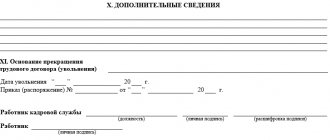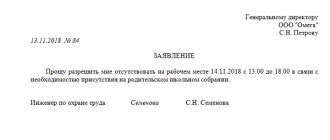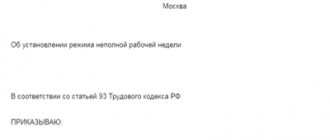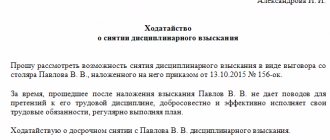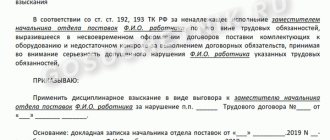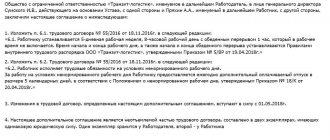What is a reprimand
A reprimand is one of the types of disciplinary sanctions that are applied in the field of labor law. Having received a reprimand, the employee is obliged to provide a report on his illegal actions and bear penalties in accordance with legal norms. A disciplinary offense is an employee’s failure to fulfill his direct labor duties or improper performance. A reprimand is applied by the employer in specific cases. The most severe measure the employer can choose is dismissal. For example, for absenteeism. As a rule, only two types of disciplinary action are often applied to employees: reprimand and dismissal. The decision remains with the employer. Although, according to Art. 149 of the Labor Code (Labor Code), he must take into account the following factors: - the degree of guilt of the employee; - amount of damage; - the circumstances that led to the commission of the offense; - personal characteristics of the employee. The legislator provides for dismissal as the most extreme sanction applied to an employee. The reprimand should motivate the employee to properly perform his job duties, and, remembering the threat of dismissal, he should not commit further misconduct in the future. A reprimand is a non-material punishment. For the guilty employee, the issuance of a reprimand carries specific material consequences: - under Art. 151 of the Labor Code, the employee cannot count on various incentive measures throughout the entire period of validity of the reprimand; — a reprimand is considered grounds for depriving an employee of bonuses and incentive payments; — whether an employee has a reprimand affects the determination of their qualification level; - according to clause 3 of Art. 40 of the Labor Code, a reprimand can become a real reason for dismissing an employee.
Is it possible to reprimand without reprimand and is it issued for absence from work?
A remark is also a disciplinary sanction, but is considered a milder sanction, since Art. 192 of the Labor Code of the Russian Federation is slightly higher in the list of punishments. A reasonable question arises: should a reprimand be preceded by a reprimand, or can it be avoided?
Labor legislation does not rank punishments according to the degree of guilt and does not establish a strict sequence for their imposition. Therefore, the employer himself has the right to assess how great the employee’s guilt in the violation is and what sanction he deserves.
Thus, a reprimand may be issued for absence from work if there were valid reasons for missing work time, a reprimand may be issued if this was done deliberately without significant grounds, and even dismissal is possible when such a violation is systemic in nature.
Here only one constant principle should be observed: one violation - one type of punishment.
A reprimand, like any other disciplinary sanction, must be issued by the employer within a month after the employee’s misconduct is revealed. The company has no right to punish the employee later. This period may be extended if the employee is absent from work due to being on sick leave or on vacation (including study).
The maximum period within which an employer has the right to issue a reprimand is 6 months. However, if a misconduct is revealed during an audit (for example, an audit), a reprimand can be issued no more than 2 years from the established date of the commission of this misconduct.
In order to issue a reprimand to the employee, or rather to issue an appropriate order, the employer has 1 month from the date of discovery of the disciplinary offense {amp}lt;13{amp}gt;, that is, from the day when the misconduct became known directly to the manager of the offending employee (for example, the head of a department) {amp}lt;14{amp}gt;.
Monthly period {amp}lt;14{amp}gt;:
- extended for the duration of the employee’s illness or while he is on some kind of leave (annual paid, additional, educational, at his own expense, etc.);
- is not extended for days on which the employee was absent from work for some other reason, for example, for additional days off.
We tell the manager
Even if it is obvious that a particular employee has committed a disciplinary offense, he cannot be reprimanded or reprimanded outside the statute of limitations for bringing disciplinary action.
At the same time, it will not be possible to issue a reprimand or reprimand if 6 months {amp}lt;13{amp}gt; have passed since the date of the disciplinary offense. The six-month period increases to 2 years if the misconduct is revealed as a result of an audit or audit (for example, during the inventory, a shortage of goods and materials was discovered due to the fault of the storekeeper).
The mentioned deadlines are preemptive for the employer and cannot be restored. Their omission excludes the possibility of applying a disciplinary sanction to the employee {amp}lt;15{amp}gt;.
Disciplinary sanctions: reprimand, reprimand
How to punish an employee when reprimanded is up to the employer to decide. For example, he may deprive an employee of various incentives for a certain time, the employee may be denied a bonus, and how his level of qualifications will be determined depends on the reprimand. In some cases, one or multiple reprimands are grounds for dismissing an employee.
Summarize:
- When I worked for us it was like this, a remark is a spoken mistake orally.
For example: Started work without a badge, or Wipe down your workplace, otherwise dust will form. And a reprimand is already a written form, which promises consequences if repeated. For example: Didn't show up for work. Although I could be wrong. - A reprimand is an action that may have a consequence, such as dismissal. A remark is simply an expression of your superiors’ dissatisfaction with your actions, but does not entail any consequences.
If such facts are revealed by the Federal Labor Inspectorate, the organization may be brought to administrative liability under Art. 5.27 of the Code of Administrative Offenses of the Russian Federation for violation of labor legislation. The penalties listed in Art. 192 of the Labor Code of the Russian Federation, can be applied not only in the sequence in which they are indicated in the Labor Code of the Russian Federation. Therefore, taking into account the gravity of the offense committed, its consequences, the identity of the offender, etc.
the employer can immediately reprimand the employee (not reprimand) or even fire him (if there are sufficient grounds). But for each violation, only one penalty can be applied (Article 193 of the Labor Code of the Russian Federation), i.e. For absence from work for more than four hours, an employee cannot be subject to both a reprimand and dismissal. Loading... What is a reprimand? What is the difference between a reprimand and a remark?
- A reprimand is the last warning, followed by dismissal (if at work). First comes a reprimand, then a reprimand, if the remark was not taken into account, therefore a reprimand is a more serious action. A reprimand can be made for all sorts of little manners, deficiencies in work. A reprimand usually follows after a severe guilty of something.
- The employer has the right to apply disciplinary measures to its employees. The main ones are reprimand, reprimand, dismissal. The remark is applied orally. An employee may receive such comments for minor violations of labor regulations. For example, being late for work once, not wearing the dress code, having a messy desk, and so on. A reprimand is already more serious than punishment. A reprimand is used when an employee has not fulfilled his job duties.
How to remove a foreclosure
As you know, if an employee who has already received a penalty violates labor discipline again within a year, the employer has every right to dismiss him. 5 tbsp. 81 Labor Code of the Russian Federation.
WE TELL THE EMPLOYEE
An order to apply a disciplinary sanction - reprimand, reprimand or dismissal - can be appealed to the labor inspectorate or district court within 3 months from the date of familiarization with the order of Articles 193, 382, 386 of the Labor Code of the Russian Federation.
But perhaps the employee realized his mistake long ago, repented and corrected himself, and the penalty weighs heavily on him...
As a general rule, a reprimand or reprimand is removed automatically if, within a year from the date of issuance of the order announcing it, the employee is not subjected to a new punishment. 194 Labor Code of the Russian Federation.
However, these penalties can be lifted early at the employer’s initiative. Both the employee himself and his immediate superior or trade unionist can apply for early removal of the penalty. 194 Labor Code of the Russian Federation. Early withdrawal of the foreclosure is issued by order in any form.
***
WE TELL THE EMPLOYEE
After the penalty is lifted, the employee is considered to have no disciplinary sanctions. Decree of the Supreme Court of September 30, 2005 No. 37-B05-8.
In conclusion, I would like to urge employers to ensure that, when applying disciplinary sanctions, they must take into account the severity of the offense committed and the circumstances surrounding it, its consequences, and take into account the personality of the offending employee. 5 tbsp. 192 Labor Code of the Russian Federation. Agree that it is unreasonable, for example, to give a person a written reprimand for being 15 minutes late, or to reprimand someone for showing up at work in a skirt of the wrong length. It is quite possible to limit yourself to oral suggestion, at least for the first time.
Source: glavkniga.ru
How to properly reprimand an employee. He refuses to write an explanation for his absence from work.
Answer
The procedure for applying disciplinary sanctions is approved by Article 193 of the Labor Code of the Russian Federation. Compliance with the procedure for imposing a disciplinary sanction is as follows: The fact of committing a disciplinary offense must be documented in the form of a memo addressed to the manager. A written explanation must be requested from the employee. It can be done both when drawing up a memo about the commission of a disciplinary offense (in this case, absenteeism), and after its commission within two working days. If the employee refuses to give a written explanation, then a statement of refusal is drawn up. The drawing up of the act must be certified by the signatures of two witnesses. An employee’s refusal to provide a written explanation is not an obstacle to applying disciplinary action. Next, an order (or instruction) is issued to apply a disciplinary sanction, but no later than one month from the date of the commission of the offense.
and this period does not include: the employee’s time of illness, his stay on vacation, as well as the time required to take into account the opinion of the representative body. Paragraph 4 of Article 193 of the Labor Code of the Russian Federation provides for cases when a disciplinary sanction can be applied after a month has expired from the day the offense was committed. The issued order (instruction) to impose a disciplinary sanction is announced to the employee against signature within three working days from the date of its publication. If the employee refuses to sign the issued order, an act (similar to the previous one) is drawn up, which is also recorded with the signatures of two witnesses. The order (instruction) on the application of a disciplinary sanction must indicate the following information: 1. The offense committed by the employee. 2. Time of commission and discovery of the offense. 3. Type of penalty imposed. 4. Documents, grounds confirming the commission of an offense. An order to impose a disciplinary sanction is an order for personnel, despite the fact that there is no unified form for it and it is drawn up according to the rules of orders for the main activity: with a stating and administrative part.
Source: hr-portal.ru
Reprimand and labor law
Article 192 of the Labor Code of the Russian Federation is applied in case of improper performance by an employee of his functions defined in the Labor Code of the Russian Federation, contract, internal regulations and other regulations.
When concluding an employment contract, the employee must familiarize himself with the local documents establishing his duties and responsibilities, against signature.
Article 192 of the Labor Code of the Russian Federation establishes the right of the employer to hold employees accountable. Thus, according to Article 192 of the Labor Code of the Russian Federation, a reprimand, along with such measures as reprimand and dismissal, is a type of disciplinary sanction.
A reprimand as a disciplinary sanction may be one of the legal grounds for the dismissal of an employee (clause 5 of Article 81 of the Labor Code of the Russian Federation) for repeated failure to fulfill duties in the presence of a disciplinary sanction.
Thus, two reprimands, provided they are legal, give the employer the right to fire the employee. But only if these reprimands were issued for various offenses (Article 193 of the Labor Code of the Russian Federation). At the same time, the management of the organization must know why an employee can be reprimanded.
Concept and legislative framework
The Labor Code of the Russian Federation and other legislative acts defining the relationship between the parties to an employment agreement do not contain the term “severe reprimand”. But this does not prevent employers from widely using this disciplinary sanction, which closely borders on dismissal.
The laws regulating the functioning of law enforcement agencies provide for the imposition of such punishment as a severe reprimand for employees in the army and the Ministry of Internal Affairs. In these structures, after a warning, a reprimand is used, and then a severe reprimand. But the use of such a measure of influence is not limited to these categories of employees.
The imposition of such penalties is permitted by federal legislation and intersectoral agreements in relation to employees of the following structures:
- prosecutors;
- customs department;
- investigative committee;
- alternative military - civil service;
- Ministry of Emergency Situations systems;
- notary service;
- maritime transport and fishing industry;
- railway workers;
- personnel involved in servicing nuclear and nuclear facilities.
The imposition of this punishment on the listed categories of personnel complies with the law and is not considered a violation.
Reasons for use
Punishment is imposed if an employee is found to:
- failure to perform official functions;
- long-term absence from service, not confirmed by legal grounds;
- systematic delays;
- inappropriate attitudes towards official duties;
- causing material damage to the company or third parties;
- neglect of safety rules that create a dangerous situation for the life and health of people;
- appearing at the workplace in a state of alcohol or other intoxication;
- acute conflicts with other employees, management, etc.
The employer has the right to independently assess the severity of the offense and the sufficiency of the measures taken.
This sanction should have the following effect:
- evaluator - the employee is informed that he is not coping with his job duties;
- warning - the employee is warned against continuing such actions;
- motivational - disciplinary action is designed to stimulate the employee to have a proper attitude towards work and adherence to labor discipline.
Algorithm for the reprimand procedure
In practice, it is recommended to carry out the reprimand procedure according to the following algorithm.
First, the employer must document the fact of non-fulfillment or incorrect performance by the employee of his job duties. To do this, the immediate supervisor of the employee who committed the offense sends a memo to the director of the company.
The report (official) note describes the fact of non-compliance with the requirements. The note sets out the circumstances, the date of the event, and specific persons who participated in it.
You can also record an offense using an act, which is drawn up by a commission created on the instructions of the head of the organization in order to evaluate the actions of the employee.
The act is drawn up in any form. The act indicates the same information as in the memorandum, but without comments. At the same time, the employer, before issuing a reprimand, must give the employee the opportunity to explain his actions. To do this, the employee must be notified that the employee has submitted an explanatory note. The employee, according to Article 193 of the Labor Code of the Russian Federation, is given 2 days to draw up an explanatory note.
If the employee does not provide an explanatory note, the employer should draw up a corresponding act.
Further, and also in the event that an explanation is presented, but the employee’s arguments do not look convincing, a reprimand is issued.
Appeal and employer liability
If a subordinate does not agree with the punishment applied to him, he can appeal the employer’s decision. You can do this in the following ways:
- write a complaint to the labor inspectorate;
- file a claim in court.
The latter option is also available for military personnel. The basis for declaring a punishment illegal may be not only the fact of the absence of a disciplinary offense as such, but also violations in the execution of the procedure for issuing a reprimand. Most often this is due to the lack of necessary documents: acts, orders, reports and memos, etc.
If a penalty is imposed unlawfully, the court may oblige the employer to cancel it.
In addition, he may face administrative liability in accordance with Art. 5.27 of the Administrative Code, which consists of imposing a fine or even temporary suspension of activities. Also, the employer may be required to pay the employee all the funds that he was deprived of due to collection (most often these are bonuses).
A severe reprimand is a specific form of disciplinary action that can only be used against certain employees. For everyone else, a regular reprimand can be applied, which is not much different from a strict one, since the procedure and grounds for their application are identical.
Order of reprimand
A reprimand is issued using an order, which must be signed by the head of the enterprise.
The order for reprimand must state the reason why the employee was reprimanded.
The local act is drawn up in such a way that it is clearly clear why the sanction was applied to the employee. This document describes the offense without going into all the details.
The order to issue a reprimand must include the following information:
— indicate the serial number and date of the order to issue a reprimand;
— indicate information about the manager and employee who committed the offense;
- indicate that all documents are attached to the order to issue a reprimand, namely:
- memorandum of misconduct (or commission act),
- notification of the need to submit an explanatory note,
- the explanatory note itself or the act of failure to submit an explanatory note;
— indicate the dates and names of the relevant documents.
The order to issue a reprimand must be signed by:
- head of the enterprise;
- employee within 3 days from the date of drawing up the order to issue a reprimand.
If the employee refuses to sign the order to issue a reprimand, then the employer will need to draw up an appropriate act about this in accordance with Article 193 of the Labor Code of the Russian Federation. In this case, information about the reprimand of the employee can be recorded in the employee’s personal file.
How can you cancel or challenge a reprimand?
It happens that the employer comes to the conclusion that the employee was punished unlawfully and wants to remove the reprimand from him. How can I do that?
Very simple. All that is required to cancel a reprimand is to issue an appropriate order from the head of the company. It can be drawn up at any time (Article 194 of the Labor Code of the Russian Federation). The employee himself or his immediate superior can also apply to have the reprimand lifted.
The order to remove the reprimand must contain a reference to the order to issue the reprimand, indicating its date and number.
An employee is considered to have a disciplinary sanction after it has been issued for exactly 1 year, if during this time he does not commit other offenses, followed by other disciplinary sanctions (Article 194 of the Labor Code of the Russian Federation). In this regard, there is one more option for removing a reprimand from an employee - wait for its automatic cancellation.
We invite you to familiarize yourself with Responsibility for the flooding of the apartment
A reprimand is a legal fact, and it must be correctly executed. Many people forget that, for example, the Labor Code of the Russian Federation does not provide for any severe reprimands. The employer has no right to officially use this phrase. If he nevertheless gives the employee a severe reprimand, then the labor inspectorate (if the employee complains there) can:
- firstly, impose an impressive fine on the company based on clause 1 of Art. 5.27 Code of Administrative Offenses of the Russian Federation;
- and secondly, to cancel the order imposing a severe reprimand.
In addition, the employer has the right to impose any disciplinary sanction, including a reprimand, only if the employee fails to perform or performs his job duties incorrectly. However, these responsibilities must be recorded somewhere: in a contract, job description, labor regulations.
Dismissal on the basis of a severe reprimand, other non-existent disciplinary sanctions, as well as when the reprimand is issued outside the regulatory framework, can be successfully appealed by the employee in court with a high probability of success. As a result, the court may oblige the employer to reinstate the person at work. And immediately.
Removing a reprimand from an employee
A reprimand is only valid for a certain period of time.
The legislation provides for various mechanisms to remove a reprimand from an employee.
There are the following ways to remove a reprimand from an employee of an enterprise:
- The passage of time. After one year has passed from the date the employer reprimanded an employee of the organization, this disciplinary sanction is declared invalid. For such annulment of a reprimand, it is not necessary to create any separate additional documents or orders. The imposed disciplinary sanction terminates automatically.
- Removal of a reprimand at the initiative of the employer. The employer, guided by reports from department heads, new explanatory notes, or at his own request, has the right to cancel the reprimand of the employee. Removal of a reprimand from an employee is carried out in accordance with a separate relevant order.
An employee of an enterprise appeals a reprimand in order to resolve a labor dispute. An employee has the right to appeal the actions of the enterprise management either to the labor inspectorate or in court.
Duration of punishment
Free legal consultation We will answer your question in 5 minutes!
Free legal consultation
We will answer your question in 5 minutes!
Ask a Question
Call: 8 800 511-39-66
The period during which a disciplinary measure in the form of a reprimand against an employee is valid is 1 year.
If during this time a person does not violate the norms of labor legislation and does not give reasons for censure, then all penalties against him are safely removed.
If for some reason an employee wants to shorten the period of validity of the penalty, then he can contact his superiors directly with a corresponding request.
But in most cases, early removal of penalties occurs by personal order of the head of the company.
The concept of disciplinary action
A reprimand and reprimand are types of penalties for evading labor discipline. Before receiving a document holding him accountable, the employee must provide in writing a full report of his actions that resulted in a violation of discipline.
What is meant by violation of discipline? The most important thing is the failure to fulfill or insufficient fulfillment of labor duties fixed in the collective labor agreement, a violation of labor discipline.
A remark is one of the types of influence on a guilty employee through disciplinary action. This punishment can be applied for a period of up to 12 months.
Committing an offense on the part of an employee may not entail malicious intent; it may be a conscious act.
If a constant violation occurs, then if such a penalty is repeated, the employer has the right to dismiss the negligent employee.
The use of a reprimand is clearly regulated by the Labor Code of the Russian Federation. It is possible to apply a reprimand and enter it in your personal file. The maximum penalty for misconduct is dismissal from the position. Absenteeism or absence from work without a good reason can be one of the reasons for a reprimand, reprimand and dismissal.
An employer, before imposing disciplinary action, must take into account certain factors:
- How guilty is the employee for committing the violation? There may have been good reasons for such an action.
- The amount of damage that was caused to employees due to their absence from work.
- What was the true reason for the committed act.
- Characteristics of the employee himself. Was this the first violation or a systematic one?
Dismissal of an employee from his position is the most extreme form of punishment. More often, a remark or reprimand is used as a warning, which should not go unnoticed by the employee.
He will draw conclusions and try not to violate labor discipline in the future.
As a rule, a reprimand does not entail any financial losses on the part of the perpetrator.
His material losses will be expressed as follows:
- lack of incentives for the period of the reprimand. This action is regulated by Article 151 of the Labor Code;
- the employee loses bonuses;
- Possible reduction in qualifications;
- systematic violation is followed by dismissal. Regulated in accordance with Article 40 of the Labor Code in paragraph 3.
What can you get for at work?
This type of disciplinary sanction can be imposed on an employee if he did not perform his job duties properly or completely avoided performing them - a reprimand for failure to fulfill duties. It is important to note that the powers of each employee must be reflected in the employment agreement concluded upon hiring.
You can also issue a reprimand for absenteeism, tardiness, violations of discipline, fights, and insults at work.
Before proceeding with issuing a reprimand, it is necessary to accurately determine whether the violation committed by the employee is included in the list of prohibited actions. Failure to comply with this rule may result in the employer being held liable.
Circumstances that may lead to the imposition of a penalty may also be reflected in other local acts, including a collective agreement.
In such situations, working citizens working for enterprises should familiarize themselves with the contents of such documentation. After studying this information, employees leave signatures on a special paper.
Each company may develop different grounds for issuing a reprimand. You can be brought to disciplinary liability in this form for various violations of labor regulations and established work rules for a specific position.
Why they can be reprimanded at work:
- failure to perform labor functions;
- failure to comply with superior orders;
- systematic or isolated delays;
- absenteeism;
- theft, damage and embezzlement of the organization's property;
- being drunk at work.
Committing such disciplinary offenses threatens the employee with not only a reprimand, but also dismissal.
Can this be done orally to the employee?
Labor legislation does not provide for the possibility of an employer to reprimand verbally. In each case, a disciplinary sanction of this type must be formalized in writing.
The main document that serves as confirmation of the existence of a reprimand is the employer’s order.
It also has another important purpose - the order contains information about the penalties applied to the employee. For example, deprivation of a bonus.
When composing a paper, the manager can use a free presentation style. The document must be signed by the responsible persons and the employee who violated labor discipline.
Is a reprimand included in the work book?
Step-by-step procedure for announcing punishment to an employee with samples
The announcement of disciplinary action is carried out in several stages. Each of them is characterized by the performance of certain actions.
It is important to correctly formalize the reprimand of the employee, document the fact of the disciplinary offense and the imposition of the penalty.
Step-by-step procedure for applying a disciplinary sanction in the form of a reprimand and documenting the imposition of a penalty on an employee under the Labor Code of the Russian Federation:
- Step 1. Drawing up an act recording the disciplinary offense. This document is the basis for considering the issue of imposing a penalty on the employee. act of disciplinary offense.
- Step 2. Drawing up a memorandum. The specialist who discovered the fact of a violation must write a corresponding paper addressed to the immediate supervisor of the enterprise. It is important to indicate in it a detailed description of what was done, if there is supporting documentation, make a link to it. .
- Step 3. Writing an explanatory note. In it, the employee must state the reason for the offense. It is worth paying special attention to the writing of this paper, because the further course of events depends on its content. To draw it up, the employee is given 2 days from the moment the violation of discipline is discovered. If after this time the explanatory note does not reach the employer, a corresponding act of refusal is drawn up. Ideally, it should be certified by witnesses who can, if necessary, confirm the fact of refusal to draw up an explanatory note. Sample explanatory note.
- Step 4. Issuing an order. It reflects the essence of the punishment applied to the offender. Responsibility for creating the document rests with the employer. .
- Step 5. Registration of the order in a special journal for recording documentation of this nature.
The employee must familiarize himself with the data of the order within several days from the date of its publication. In case of disagreement with the information specified therein, an appropriate act is drawn up.
Consequences of overlay
Recently, a rule was adopted according to which information about a reprimand is not entered into the work book. Despite this, the consequences of imposing a penalty can be quite sad.
The most undesirable course of events is dismissal.
Termination of the employment relationship is possible if the reprimand is issued repeatedly.
In some situations, early withdrawal of a sentence is allowed.
In addition, disciplinary action threatens a citizen with a reduction in his income. The payment of bonuses, allowances and other incentives is suspended.
Is it possible for a pregnant woman to carry it to term?
Pregnant women working on an official basis are provided with various privileges. This is due to the employee’s condition—excessive loads, stress, etc. are contraindicated for her.
Certain nuances are also present in the issue of imposing disciplinary sanctions on workers in this situation. In accordance with the current legislation of the Russian Federation, disciplinary measures may be applied to a pregnant woman on a general basis.
At the same time, it is important to pay attention to the exception - in any case, the woman cannot be fired - details here.
Can the director announce his own punishment?
The Labor Code of the Russian Federation establishes the possibility of applying disciplinary sanctions to all employees, including those who hold leadership positions.
When imposing punishment for an offense committed, it is necessary to be guided by Articles 192 and 193 of the regulatory documentation.
The founder of the organization and the participants in the collective meeting of shareholders can hold the director accountable.
This right belongs to a person or group of people with whom the director has entered into an employment contract. He cannot reprimand himself.
A detailed statement of information about the rules for bringing a director to disciplinary liability must be present in the relevant documentation - the Charter or another similar document.
Results
Issuing a reprimand is an official procedure, fixed at the level of a local document (in an order from the head of the company), on the application of an appropriate disciplinary measure against an employee.
However, the issuance of this order must be properly formalized by the authorities by preparing a documentary base, including:
- sources recording the misconduct (memo, commission act);
- notifying the employee of the need to draw up an explanatory note;
- in case of failure to provide an explanatory note - a statement about this;
- in case of refusal to sign the order of reprimand by the employee, also the corresponding act.
A reprimand should not be called a severe reprimand, otherwise the labor inspectorate or court will cancel the order issuing it.
The reprimand must be justified. It can be issued due to the employee’s failure to fulfill only those duties that are recorded in the provisions of documents endorsed by the employee, such as an employment contract, job description, or company labor regulations.
If you have any unresolved questions, you can find answers to them in ConsultantPlus. Full and free access to the system for 2 days.
In what situations are comments made?
A number of disciplinary penalties regulated by Art. 193 of the Labor Code of the Russian Federation, the charter and the relevant regulations.
If an organization decides to punish an employee in another way - by fining or depriving a bonus, then it risks being held liable under Art. 5.27 Code of Administrative Offenses of the Russian Federation.
In Art. 192 of the Labor Code of the Russian Federation, penalties are listed in ascending order. But this does not mean that the manager should hold the employee accountable in exactly this sequence. The severity of the offense committed, the consequences and personal qualities of the offender are the main indicators on the basis of which the manager makes a decision to impose a disciplinary sanction or to sever the employment relationship.
1 offense = 1 punishment, that is, if an employee left the workplace without permission for more than 4 hours, then he can either be fired or reprimanded. But if the offense led to damage to property, then the manager can apply measures of both disciplinary and financial liability.
The current labor legislation does not provide a clear description of the appropriateness of applying a particular disciplinary sanction. That is, the election of a certain punishment falls on the shoulders of the director of the organization.
As practice shows, a reprimand is usually issued for the following types of misconduct:
- labor discipline was violated one time;
- the duties set out in the job description were not fulfilled once.
The most popular example of a non-gross misconduct: failure to comply with the established work schedule (being late). Often ends with a remark. A disciplinary sanction order is valid for 1 year. Violations during this time may result in more severe disciplinary action or termination.
Drawing up an order for punishment requires evidence, that is, if we are talking about being late, then you need to record this moment in the following ways:
- take readings from a device located at the checkpoint if the enterprise has a magnetic card system installed;
- draw up an official document in the presence of witnesses about violation of labor regulations (the recommended number of witnesses is at least 3 people).
Legal consequences
A note about reprimanding the employee is not included in the work book. At the same time, it can be added to his personal card to track the number of disciplinary sanctions.
Also, from the point of view of labor legislation, the list of possible legal consequences from issuing a reprimand is very small:
- Deprivation of an employee's bonus . The employer's internal documentation (in particular, internal regulations, regulations on bonuses) may provide for the possibility of depriving an employee of a bonus if he has existing penalties in the form of a reprimand. Considering that the bonus portion can be a fairly large part of earnings, the consequences of a reprimand can be quite significant for the employee.
- Dismissal . Based on the provisions of Art. 81 of the Labor Code, in case of failure to fulfill labor duties and in the presence of outstanding disciplinary sanctions for a repeated offense, an employee can be dismissed. For example, an employee cannot be fired for a one-time delay to work, since this can be considered a disproportionate punishment, but for a repeated offense this is allowed.
- Entering information about the reprimand into your personal card . This may negatively impact an employee's career growth opportunities.
The specified list of legal consequences is exhaustive, and if the reprimand became the basis for labor discrimination of the employee and infringement of his rights, then he has the right to complain against his employer to the labor inspectorate.
The supervisory authority must conduct an inspection of the employer within 30 days and issue an order to eliminate violations.
Withdrawal procedure
Termination of the imposed penalty is possible in the following cases:
Expiration of the specified period
A reprimand given to an employee is valid for one year after its issuance. After this, the punishment is automatically lifted, but only if during this period he did not commit any violations.
Early removal of punishment
This can happen either on the initiative of management or at the request of the subordinate himself. In the first case, the employer can remove the punishment if the employee shows good work results and deserves encouragement. At the same time, this can only be done by the person who imposed the penalty, or someone equal or higher in position (rank). Only one penalty can be lifted from a subordinate at a time.
In the second case, the employee himself submits an application to management with a request to cancel the previously announced reprimand. The employer reviews this document and makes a final decision on whether the proper educational impact was exerted on the subordinate by this punishment or not.
Is it salary escrow? The answer to this question is in our informative article. Find out more about the period for paying maternity benefits in our detailed article. You will find out how much pension a former civil servant can expect!


